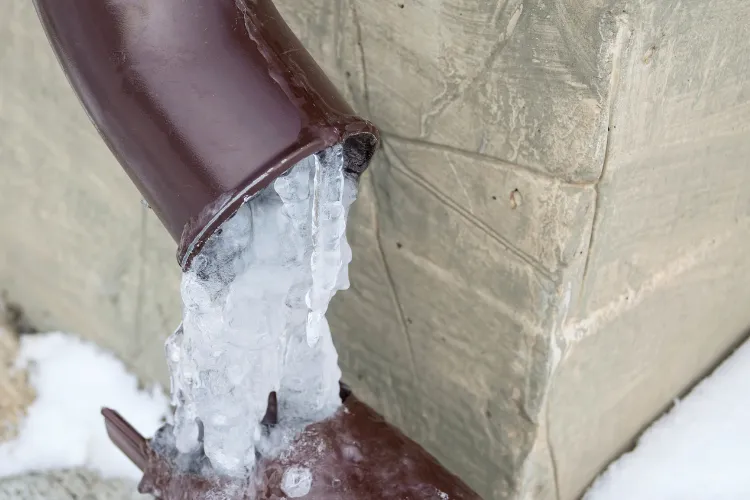
Preventing Frozen Pipes in Colorado: Preparing Your Home for the Cold Months
As the crisp chill of winter descends upon the picturesque state of Colorado, homeowners across the region know that it's time to prepare for the cold months. One of the most significant challenges during winter in Colorado is the threat of frozen pipes. Fortunately, our plumbing experts in Colorado are well-equipped to fix frozen pipes, ensuring homeowners peace of mind during the frosty season.
Here, we will delve into the ins and outs of safeguarding your home from frozen pipes in Colorado. We'll address common questions like, "Do water pipes freeze in Colorado?" and provide practical solutions, such as using heat tape to prevent frozen pipes and how to prevent a frozen condensate pipe.
Understanding the Frozen Pipes Challenge in Colorado
Do Water Pipes Freeze in Colorado?
Colorado, renowned for its stunning mountain landscapes and outdoor recreational opportunities, also experiences some of the most frigid winters in the United States. It's no surprise that homeowners in this beautiful state often grapple with the issue of frozen pipes. Understanding the factors contributing to this challenge is crucial for effective prevention.
Factors Contributing to Frozen Pipes
Extreme Cold: Colorado winters can be brutally cold, with temperatures often plummeting well below freezing, especially in the mountainous regions. This prolonged exposure to sub-zero temperatures increases the risk of water pipes freezing.
High Altitude: Colorado's high elevation, with many areas situated over 6,000 feet above sea level, can further intensify the cold. The higher altitude results in thinner air, which struggles to retain heat, making it more challenging to keep pipes from freezing.
Snow Accumulation: Heavy snowfall, while picturesque, can create insulation around the ground. This insulation prevents heat from escaping, causing the ground to freeze. Frozen ground can, in turn, affect the temperature of the soil surrounding your water pipes, increasing the risk of freezing.
How Do I Keep My Pipes from Freezing in Colorado?
Now that we've established the risk, let's explore comprehensive measures to keep your pipes from freezing, ensuring a warm as well as comfortable home throughout the winter.
Preventative Measures to Protect Your Pipes
Proper Insulation Is Key
Insulating your water pipes is a fundamental step in protecting them from freezing. Pay close attention to exposed pipes in unheated areas like basements, crawlspaces, and attics. Use foam pipe insulation or heat tape to wrap these pipes, creating a barrier against the cold.
Proper insulation serves as a thermal blanket for your pipes, helping to maintain the water temperature inside them and preventing exposure to frigid air.
Use Heat Tape to Prevent Frozen Pipes
Heat tape, also referred to as heating cable, is a reliable and proactive tool to prevent frozen pipes in Colorado. It consists of a heated wire that wraps around the pipe's length, providing consistent warmth to prevent freezing.
Clean the Pipes Thoroughly: Before installation, make sure that the pipes are clean and free from debris.
Wrap the Heat Tape Evenly: Carefully wrap the heat tape evenly around the pipe, making sure there are no gaps or overlaps.
Secure the Tape: Use insulation or electrical tape to secure the heat tape in place, ensuring it remains snugly attached to the pipe.
Regulate Temperature: Plug the heat tape into an electrical outlet equipped with a thermostat to regulate temperature automatically. This ensures that the heat tape operates only when necessary, conserving energy and reducing the risk of overheating.
Maintain a Consistent Temperature
Maintaining a consistent temperature in your home, even when you're away, is crucial for preventing frozen pipes. Set your thermostat to at least 55°F (12°C) during the winter months. Alternatively, consider installing a smart thermostat that allows remote temperature control, ensuring your home stays warm and your pipes remain unfrozen.
Consistency in temperature is key to protecting your plumbing from the harsh Colorado winters.
Seal Leaks and Cracks
An often overlooked aspect of preventing frozen pipes is sealing gaps, leaks, and cracks in your home's foundation and walls. These openings allow cold air to infiltrate your living spaces, potentially affecting your pipes' temperature.
Inspect your home thoroughly for any gaps or cracks, paying close attention to areas near pipes. Seal these openings using caulk or insulation to prevent freezing temperatures from compromising your pipes' integrity.
Drip Prevention
Allowing faucets to drip slowly during extremely cold nights can prevent freezing by keeping water flowing. Running water is less likely to freeze, reducing the risk of pipe damage due to ice buildup.
While this method may lead to slightly increased water usage, it provides peace of mind and avoids the costly consequences of frozen pipes.
How to Prevent a Frozen Condensate Pipe
To prevent a frozen condensate pipe, follow these steps:
Install a Condensate Pipe Insulation Kit: These kits are designed to keep the condensate pipe warm, preventing freezing.
Utilize a Condensate Pipe Heater Cable: Similar to heat tape, a condensate pipe heater cable provides consistent warmth, ensuring that the pipe remains ice-free.
Regularly Check for Obstructions: Periodically inspect the condensate pipe for any obstructions or ice buildup. Promptly clear any blockages to maintain proper functionality.
In Conclusion: Ensuring a Warm and Worry-Free Winter
Protecting your Colorado home from frozen pipes is essential for maintaining a comfortable and stress-free winter. By implementing proactive measures such as proper insulation, heat tape installation, consistent temperature maintenance, and sealing gaps and cracks, you can significantly reduce the risk of frozen pipes. Additionally, taking measures to safeguard your exterior faucets, allowing faucets to drip during extreme cold, and enlisting professional assistance for winterization will ensure that your home remains warm as well as cozy throughout the winter season.
The Good Life Plumbing services can help to insulate your pipes and safeguard them from chilling temperatures. Call us now to learn more about our plumbing solutions!
Learn More About Handling Recurrent Pipe Clogs!

